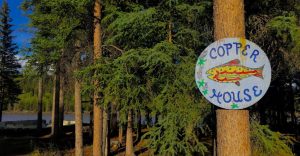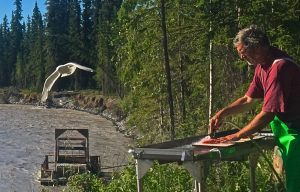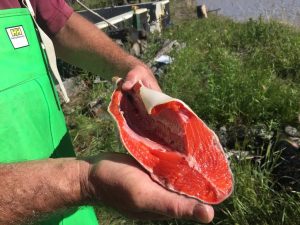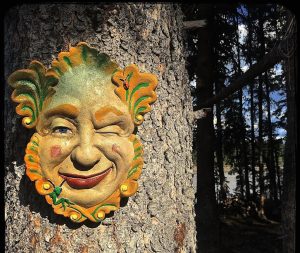I am not a religious man, but I think moving water is the best thing God ever made. -Jim Harrison
Standing at the river’s edge, I watch sticks from old uprooted trees quiver in the foaming brown current. In the early morning sun, gulls throw down their shadows, the tips of their wings translucent against the wild blue. They wheel over our heads, dive-bombing fish guts thrown into the river from our cleaning table. They know where the good food is, and argue over every last scrap.
The moving, life-giving water leaps and tumbles, and I imagine just below the surface long schools of salmon nosing their way upriver, eager to return to their natal grounds, like power-forwards from the sea, fighting like hell to complete another cycle in the wheel of life. It’s so simple, really. In the plant and animal worlds (ourselves included), we sprout at birth and decompose at death, feeding the earth with our compost, completing the endless circle of life that sweeps voraciously through time.
My community is busy, checking their fishwheels hourly, making all manner of technical adjustments, like the raising and lowering of the wheel as the water level rises and falls, keeping axles on the wheel greased, predicting when the next run will hit (midnight, 6 am?). Who’s to know? It’s a finicky business catching fish. You wait and you
watch; then pounce at the appropriate time. It’s all about timing when the fish decide to come to you, the Native people say. The river has nourished them for thousands of years, my family, only decades. Still, the ritual runs deep.
But this year I take pause to think about our yearly fishing ritual in more detail. In Jonathon Balcombe’s recent book, What a Fish Knows, he overturns our assumptions about how fish perceive. He tells us they have feelings, awareness and a social order that is, in some ways, similar to those of people. Scientific research has shown that fish display tool use (at the level of a 10-month old baby who learns to use a tool to retrieve a toy she can’t reach). Fish enjoy music, have distinct personalities, and feel pain, although he uses the word “suffer,” which I’m not so sure I would agree. Sensory pain is one
thing, but “suffering” denotes for me at least, a “thinking about” the pain, another layer of psychological thought placed on top the pain, creating more misery, and I think we humans have a corner on that market.
Studies have also shown that salmon farms naturally have “drop out” fish, growth stunted fish that float lifelessly at the surface of farming ponds. These fish are severely depressed. Why? Because they have given up on life. Their brain chemistry and behavior is said to mimic those of other animals with documented depression. They are smaller in size due to “failure to thrive” (like human babies who experience stunted growth in the absence of love and affection).
Halcomb goes on to say, however, we shouldn’t eat fish because we cause them to experience an “unpleasant” death, whether by sport-fishing with lures or commercial fishing via nets. Do we then have a moral obligation to assure a pleasant death for fish (and other animals), or should we stop the killing and not eat them at all? Surely we attempt to assure a pleasant death for humans by way of hospice and palliative care that provides relief from the symptoms of serious illnesses. How should we treat our fellow winged, gilled and four-legged creatures?
Upon close inspection though, many of the writers in disagreement with the predator-prey relationship (the circle of life?) have a hidden, or not so hidden agenda. One day, they say, all people will “wake up” to the healthier and more compassionate preference of not eating, or using any type of animal products.
No meat, cheese, eggs, milk, crustaceans, fish, leather, fur, or their byproducts. Some claim they intend to be patient with the education process, and are convinced, in a sort of evangelical way, that people will see the benefits of vegan-ism, and will eventually right their “erroneous” thinking on the subject.
I do not consider the life-ways of indigenous people, of whom there are many across the globe, to be erroneous. The Native people don’t see the taking of animals as exploitation or cruelty. Their worldview encompasses the animal in a symbiotic and spiritual relationship with the human; that one dies for the express purpose of giving life to another. They believe we humans don’t walk outside the circle of life, looking through a one-way mirror at the specimens contained within.
We are part and parcel of that circle, during the normal, though violent act of birth; as we live year to year and co-exist with all of life’s pain and suffering. And at the end (death is not an outrage) when we die, however peaceful or terrifying that may be. My worry is that this homogenous way of thinking, the recruiting of people to vegan-ism, will inadvertently destroy the many varied and unique cultures of the world. The people of various cultures spring up and are defined by the landforms and weather patterns they inhabit. They have their own foods, languages and ways of being. Should the Inupiat people be prohibited from taking whale, the centerpiece of their spiritual life and the lifeblood of their people? Taking away their indigenous foods is exactly how failure to thrive and depression would show up in the people who respect and give thanks to their fellow creatures for granting them life.
In all practicality, eating greens at 40 below in the vast, treeless landscape of northern Alaska will not sustain you. Though the skin and the blubber of the bowhead will. Should those of us who harvest natural food from the living waters be advised to eat artificial instead, like shrink-wrapped meat substitutes? Imitation crabmeat made of fillers, fake flavoring and dyes? I don’t have definitive answers, but so far, I’m not convinced. I only skim the surface like the gulls wheeling overhead, feeling stuck in this literal world above water, unable to dive deep enough to fully understand the life-giving secrets of how we are so deeply connected to the food we eat. But I know in my heart of hearts what is true. Red salmon harvested from the breathing waters of the Copper River is a great gift, representing so much more than a “commodity” or a “resource.” It comes with a lightness and energy that inexplicably ties us to the natural world, a part of something much greater than anything in the supermarket isles could ever provide.
What I do know is life and death spring forth from this land, simultaneously. It is the hunters and fishermen who have taught me, through example, how deeply people can believe in the sacredness of life, and death. When you take away venerated foods, you potentially destroy a vivid and unique culture. You destroy worldviews in which people do not dictate “right” living to others, but live their lives as people who clearly see and appreciate their rightful place not only in the world, but born of it, as integrated links to the rest of creation.
What to do when, we consider the inner lives of plants and how, as Daniel Chamovitz says in his book, What a Plant Knows, that plants
too, have feelings and uprooting them causes pain? That they prefer the melodies of Bach over the rock guitar riffs of Led Zeppelin. That the discovery of talking to plants may prevent failure to thrive. That plants are aware of their surroundings.






Great food for thought, no pun intended. This is a subject I struggle with, and haven't yet, despite having lived 56 years on this planet, come to a conclusion I'm fully at peace with. I have a deep respect for the reverent thought you've put into this, and appreciate a perspective I hadn't yet examined well enough. Thank you, dear Monica. You're a woman of outrageous talent and quiet wisdom. – Sydnee Crain
'The world is too much with us' — indeed, and going back to what would seem a more natural way of living is easier said than done. Besides, as you point it, in the natural order of things respect is shown even for animals killed in the scheme known as survival of the fittest. You've given me much to think about in this beautiful reflection.
I too, struggle with the issue as we learn more and more about animal and plant life, and how they intersect with us humans. I too, have lived long enough to see so many food trends come and go to the point where I find myself condemning rather than celebrating what I put into my mouth. Thank you for your thoughtful comment, Sydnee.
The "natural order of things" is both lovely and harsh, two sides of the same coin, I think. Thanks, Deborah.
Difficulties arise, I think, when people become so utterly detached from the natural world — from the life of the earth and the flesh — that they actually prefer all of the world to be spirit. I've noticed that some who passionately advocaate for vegetarianism or veganism seem to shudder a bit at the thought that, despite their evangelical fervor on behalf of their beliefs, the rest of the world continues on its merry way, chomping and being chomped in turn. This morning, I watched a shrike pluck a newly-hatched duckling from the water, then neatly tear it to pieces atop a piling. Should we condemn the shrike, or advise a change in diet?
Annie Dillard tells of watching a mosquito land on the back of a copperhead, where it took a full two or three minutes to fill itself with blood before flying off. Then, she reflects:
"Is this what it's like, I thought then and think now: a little blood here, a chomp there, and still we live, trampling the grass? Must everything whole be nibbled? Here was a new light on the intricate texture of things in the world, the actual plot of the present moment in time after the fall: the way we the living are nibbled and nibbling — not held aloft on a cloud in the air but bumbling, pitter and scarred and broken, through a frayed and beautiful land."
Yes.
I am most grateful for your thoughtful and intelligent response. We all hope for "pleasantville", an uncomplicated pain-free life, and death. If we behave with dignity and care towards the animal world, grace and meaning inevitably follow. Leave it to Annie Dillard to so poetically capture the circle of life argument; I especially like how she notes how we, as humans, are not held "aloft" or above our fellow creatures, but exist in tandem as simply a part of the bigger picture.
Monica, I read this last week and really liked it so much. Life is so complex and there are no simplistic "answers". The Native Americans here taught me so much about respecting life, about the other creatures who share our earth, about honoring those who give their lives for us.
I often used to say we ate "vegan plus fish". I truly adore eating vegetables and fruit and grains and nuts and such. They seem to nourish this soul so much. On the other hand, any label whether it's "meat-eater" or "vegan" or "vegetarian" seems to limit us. It limits me. My mind hears a label and thinks it understands a person. When, in reality, a label never explains the complexity.
Now I like to eat as a response to Spirit. What's next? Who knows? It could be a blackened lake trout if the Universe provides. It could be a quinoa zucchini corn garlic macademia nut salad–and it hopefully will be in a couple hours! Once, recently, I stopped at a restaurant called the Bearded Dog down in Gaylord and they seated me at the bar and said their sirloin tips were to-die-for. If one were stuck in a label as "vegan" or "vegetarian" they might have missed one of the best meals ever created.
Did you ever read Braiding Sweetgrass by Robin Wall Kimmerer? She says the sweetgrass will grow richer and more abundant when humans honor it by harvesting. Fascinating!
Kathy, thanks for your enlightened response. I will have to read Kimmerer's book. It's all about attitude, in a way, as evidenced in the last sentence: humans honor their food by harvesting (I think this applies to both the plant and animal world). Labels are limiting. Twenty years ago, I was "vegetarian", during the intense yoga years; but now I dump all labels. While traveling, I will eat what I'm served in whatever culture I'm immersed in. Breaking bread is how people share their hearts, and nit-picking every dish appears unkind (with the exception of having to control an actual illness). Last night we had halibut, freshly caught from Prince William Sound. Food never tasted so good!
nice post